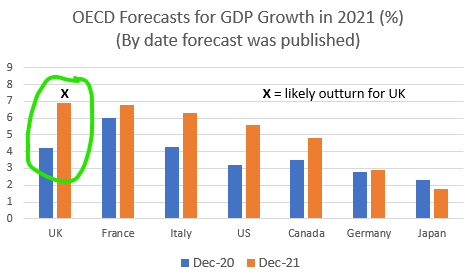
Reflections on the morning after - and especially the markets… 🧵
It may well take some time for the dust to settle on #KwasiKwarteng’s first #Budget (yes, 'Budget’: if it looks like a duck, walks like a duck and quacks like a duck, then it’s fair to call it a duck)...
It may well take some time for the dust to settle on #KwasiKwarteng’s first #Budget (yes, 'Budget’: if it looks like a duck, walks like a duck and quacks like a duck, then it’s fair to call it a duck)...
The initial reaction from most economic commentators and in the financial markets has been a loud boo! There are some things I would have done differently. But the overall strategy is sound, and sentiment should recover as the economic benefits become clearer...
There are two aspects I particularly liked. One is the emphasis on breaking the ‘doom loop’ of weak economic growth and rising taxes, both with tax cuts and – at least as importantly – structural reforms on the supply-side...
The second is the willingness to take decisions that are unpopular but still right for the economy, such as scrapping the cap on #bankersbonuses and abolishing the additional 45% rate of income tax. Policy should not be based on opinion polls or focus groups...
This is not about #TrickleDownEconomics... 🙄
If #trickledown means anything it is about giving rich people more money in the hope they will spend it, boosting *demand*. Instead, #Trussonomics is about improving the *supply-side* performance of the economy...
If #trickledown means anything it is about giving rich people more money in the hope they will spend it, boosting *demand*. Instead, #Trussonomics is about improving the *supply-side* performance of the economy...
It is right to worry about the reaction in the markets, but not to panic. Much of the commentary here is increasingly OTT.
In my view, the fall in the #pound is less of a concern than the rise in #gilt yields (the cost of long-term government borrowing)...
In my view, the fall in the #pound is less of a concern than the rise in #gilt yields (the cost of long-term government borrowing)...
The slump in #sterling is still primarily about dollar strength. The US currency has been strong across the board, reflecting the relatively aggressive #Fed tightening (three ¾ point rate hikes in a row), the lower exposure to Europe’s #energycrisis, and safe-haven demand...
On a trade-weighted basis against a basket of currencies, the recent fall in the #pound is still large (about 5% since the start of August, which might add 0.5% to #inflation if sustained), but not disastrous. The UK does not have an exchange rate target and should not intervene.
The rise in #gilt yields is more worrying. Unlike a weaker pound, which helps exporters, everyone loses from higher long-term interest rates.
There is a risk of an alternative ‘doom loop’ of rising interest costs and more borrowing, offsetting the good done on the supply-side.
There is a risk of an alternative ‘doom loop’ of rising interest costs and more borrowing, offsetting the good done on the supply-side.
My advice would have been to delay the announcement of the additional cuts in income tax (which is what seems to have most spooked the markets) until a full #Budget later in the year.
These cuts are the right thing to do, but will not come into effect until April anyway...
These cuts are the right thing to do, but will not come into effect until April anyway...
This would have allowed #KwasiKwarteng more opportunity to set tax cuts in the context of a full medium-plan for the public finances, with a full #OBR analysis.
(The fiscal documents published yesterday do go into more detail, but few read beyond the speech.)
(The fiscal documents published yesterday do go into more detail, but few read beyond the speech.)
Nonetheless, the surge in #gilt yields is not disastrous either.
Like the fall in the pound, it partly reflects a global rise in interest rates. UK 10-year yields have risen nearly 3%-points in the past 12 months, but French yields are up 2½%, and the US and Germany 2¼%...
Like the fall in the pound, it partly reflects a global rise in interest rates. UK 10-year yields have risen nearly 3%-points in the past 12 months, but French yields are up 2½%, and the US and Germany 2¼%...

To some extent too this reflects a long-overdue adjustment – and probably an overshoot. The markets are now speculating the #BoE may have to raise rates as high as 5%. That is the upper end of what *might* be the ‘new normal’ (4-5%, based on 2% inflation and 2.5% real growth)...
But I suspect that UK rates will still peak between 3-4%, partly because higher levels of debt make the economy more sensitive to higher rates.
UK bond #yields have now also risen to levels that should attract international buyers, especially with an under-valued currency...
UK bond #yields have now also risen to levels that should attract international buyers, especially with an under-valued currency...
In short, talk of 'market meltdown' and a 'sterling crisis' is still overdone.
It may take more time to win over investors and the general public, but the most important thing is to get the economics right. This is a good start, despite the negative headlines.
[Ends].
It may take more time to win over investors and the general public, but the most important thing is to get the economics right. This is a good start, despite the negative headlines.
[Ends].
"medium-term plan", obviously 🙁
• • •
Missing some Tweet in this thread? You can try to
force a refresh






